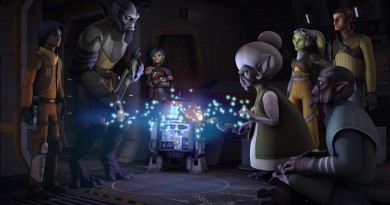Fanon, Canon and the Blurring Lines Between Them

A few weeks ago, I had a chance to consult with one of the editors from New York Magazine on the impact of fanfiction on the book world. The magazine contributed a fantastic set of essays on the topic to Vulture’s It’s a Fanmade World. Apparently this is a hot topic lately, as Vanity Fair offered a fascinating look at the ways Fifty Shades of Grey, a Twilight fanfic that had its serial numbers filed off before making Random House millions of dollars, changed the literary world. In the piece, agents and editors discuss scouring fan fiction boards for the next E.L. James.
“We’re getting deals everywhere,” explained London-based literary agent Lorella Belli, who snagged a six-figure advance from Simon & Schuster for her author Sophie Jackson’s forthcoming trilogy, A Pound of Flesh, which also started out as Twilight fanfic. “[Fan-fiction writers] already have such a huge following without doing any kind of promotion,” she continued. Jackson’s story drew more than 4 million reads on Fanfiction.net, and she’s gone from being a schoolteacher in Britain to having three major publishing houses bid up her debut novel. Just last month, Hollywood agent Steve Fisher at Agency for the Performing Arts signed on to secure the film rights.
Belli and her colleagues have gotten into the practice of scouring popular fan-fiction sites, as well as Amazon’s comparatively new fanfic portal Kindle Worlds, for potential talent. But her current crop of writers from the fan-fiction pool solicited her, she noted, adding that the submissions she receives from fan-fiction authors are often higher in quality than the average submission. “Readers of fan fiction are much more sophisticated than most people give them credit for—they’re quite discerning.” Accordingly, they’re not shy in expressing their opinions about stories.
“It’s almost like having thousands of editors at one time,” said first-time novelist Anna Todd who credits fan fiction and its open-forum style with helping develop her writing chops.”
Despite the admission by some agents that fan fiction writers are knowledgeable and often skilled, many in the publishing world still look down upon efforts of fan writers.
Yet, several years and six-figures-plus advances later, the publishing world still brands fan-fiction authors with a scarlet letter. Belli feels the snobbery and criticism leveled against Fifty Shades of Grey and fanfic-based books like it is “small-minded”: “Fifty Shades of Grey has put loads of cash into publishers’ pockets around the world, who can buy more books, and has opened up the market in an incredible way,” she says.
So here’s a reminder from Vulture on some of the famous authors who have also dabbled as fans, including Lev Grossman and Meg Cabot. Oddly enough, Phil Noto taking inspiration from The Force Awakens trailer as a fan artist didn’t generate negative buzz and ended with him working on the cover image for the upcoming Journey to The Force Awakens comics for Marvel. Hopefully the disconnect in the perception of fan fiction, which is mostly female, compared to fan art will someday be eliminated. Ultimately, both endeavors can be a good way to provide a proof of concept for an aspiring professional creator.
For Valentine’s Day, PBS Idea Channel took a deep dive into the world of fan fiction and slash as it related to the series finale of The Legend of Korra. While discussing the blurry line between fanon versus canon, the now legendary Star Wars Expanded Universe was used as an example. Host Mike Rugnetta explains the driving force behind fan fiction as fans “wanting more and better things for the characters [they] love.” Often more and better, Rugnetta describes, includes projecting the social language of interaction into romance. In explaining ’shipping, he postulates that the popularity of slash fic, specifically male/male, exists because male characters have dominated the balance of “complex, interesting characters” and therefore are the characters that fans are more likely to use to create “complex, interesting relationships.”
That is why when a show like The Legend of Korra creates many “complicated female characters with agency” it shouldn’t be surprising that many fans shipped Korra and Asami. In fact, the response to the ending, from male and female fans alike, was universally positive, driving home the point that neither gender nor sexuality are limiting factors in how an audience will react, but rather relatability. At Comics Alliance, Juliet Kahn explains what sets the show apart:
I love superhero comics. I love science fiction. I love fantasy. I love fiction. But in them, no matter the warp drives, enchanted swords, or 300-page orc taxonomies, I am never allowed to be anything but a woman. And “woman,” in prestige drama and greasy paperback alike, means lesser—as does “not white.” This can be as dismal as, say, a female character in League of Legends’ armor options, but hell, even the “enlightened” stuff lacks the guts to actually upend the deepest assumptions we make about gender and race. I love the risks George R.R. Martin takes with Daenerys’s rise to power, but he sure does love describing her recently developed breasts. And when it comes to people of color, well: The Dothraki are marauding barbarians, the Summer Islanders and the Dornish are the hedonistic brown people, and the Meereenese affront Dany’s cultured sensibilities with their love of dog sausage and bloodsport. Or hey, let’s consider the Bioshock series. It’s brilliant and boundary-pushing, sure, but I can’t quite ignore its habit of stoking the fires of man angst with tragic female fates. I can’t quite ignore that, despite supplemental material informing us of her genius and good intentions, Daisy Fitzroy dies the Angry Black Woman.
We praise the best of science fiction and fantasy as inventive, innovative, and imaginative, but that aversion to the mundane rarely extends to gender or race. Over and over again, we turn our noses up at the revolutionary possibilities of these genres, choosing instead to recreate the restrictions of our own world—just, you know, with dragons. We choose, over and over again, to use medieval England as our jumping off point. We decide that another Chosen Dude is exactly what our stories need and maybe, if we are feeling especially gracious, we give his girlfriend a sword and let her get a good line or two in about no man telling her what to do. We put bridge officers in minidresses. We put women in refrigerators. I read these books, I watch these television shows, I play these games, and I enjoy them. But they keep me in my place.
It’s tempting to say that The Legend of Korra smashes these restrictions–but that implies a certain level of attention. Korra, rather, acts as though they don’t exist. Why couldn’t a single, grumpy, fifty-something policewoman be one of the major supporting characters in an all-ages fantasy tale? Why couldn’t the heroine be a dark-skinned, visibly muscular tomboy? Why couldn’t you create a fictional world with absolutely no white people in it? Why couldn’t that become one of the most celebrated television sagas of the last decade—something people of every age and background watch?
As much as I love fantasy and science fiction that grapples with issues of race and gender, it was incredible to immerse myself in a world in which they just didn’t exist.
Even Forbes covered the overwhelming positive fan reaction to the season finale, which, as the PBS Idea Channel piece explains, boils down to fan validation. Boba Fett’s increased presence in the Star Wars movies and canon is another example of fan validation working to a franchise’s benefit. Of course, there are times when a story has to do something, as suggested by Joss Whedon, the fans and/or story “needs” rather than what the fans think they “want.” But in plenty of instances storytellers have chosen to resist validating the reasons fans develop an affinity for a show, particularly when it comes to ’ships. In television, the decline of Moonlighting beyond Dave and Maddie cementing their relationship has often been used as a reason for avoiding bringing other couples together, ignoring the fact that numerous other poor storytelling choices were made that doomed the show.
Back in the Star Wars Expanded Universe, the books went out of their way to address continuity-based concerns provided almost exclusively by male fans. These issues were taken to heart and considered, at times to the detriment of the stories themselves, but at least provided validation to the subset of fandom that raised the concerns. On the other hand, ’ships were handled like hot potatoes, generally ignoring the wishes of large swaths of female fans. This in turn created a cycle where female fans felt their concerns were being deferred or ignored.
Ultimately, a franchise cannot sustain a fanbase if it doesn’t validate its fans. More recently, the return of Ahsoka Tano to Star Wars Rebels provides an example of validating fans’ faith and passion for a character. Notably, the reaction to the finale of Star Wars Rebels first season finale felt similar to the reaction to The Legend of Korra. Ultimately the lesson from fan fiction, The Legend of Korra, and Star Wars Rebels is that a relationship of give and take needs to occur between franchises and fans for them to flourish.
Related post:
Tricia Barr took her understanding of brand management and marketing, mixed it with a love of genre storytelling, and added a dash of social media flare to create FANgirl Blog, where she discusses Star Wars, fandom, and strong female characters. She is one of four authors on the upcoming Ultimate Star Wars from DK Publishing, has written several feature pieces for Star Wars Insider magazine and is a contributor for Her Universe’s Year of the Fangirl. Her FANgirl opinions can be heard on the podcasts Hyperspace Theories and RebelForce Radio Presents Fangirls Going Rogue.
Tricia Barr’s novel, Wynde, won the 2014 Independent Publisher Book Award Gold Medal for Best Science Fiction/Fantasy/Horror Ebook. She was also part of Silence in the Library’s successful all-female creator science fiction and fantasy anthology Athena’s Daughters, which is available now. For excerpts and tales of her adventures in creating a fictional universe, hop over to TriciaBarr.com.
For updates on all things FANgirl follow @FANgirlcantina on Twitter or like FANgirl Zone on Facebook. At times she tries the Tumblr.
- Hyperspace Theories: Bad Luck Ghorman - June 2, 2025
- Hyperspace Theories: One Year Later as ANDOR Kicks Off Season Two - May 15, 2025
- REVIEW: Tales of the Underworld - May 4, 2025











Pingback:TWG Roundup: Fan Creations, Geek Fashion, Interviews, and More! | The Wookiee Gunner